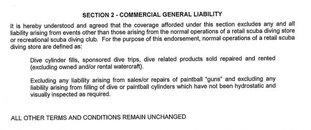Pretty sure it simply means "someone who tries to make money in diving" and nothing more. OP simply decided he wasn't the mythical scuba police.
This was all I was really getting at. There are (seemingly, from my understanding) three parties here.
1. The OP and his son who recognized that tanks were out of service.
2. The dive boat that the tanks were on.
3. The dive shop that the tanks came from.
It's unclear to me if 2&3 are the same thing from the OP, but let's just assume that they're the same company. The OP notified the crew. What was the crew supposed to do? What would have made all parties satisfied? Cancel the charter and make sure that the tanks got taken out of service? At the point where all parties involved knew that the tanks were out of service there was only one choice left to make: To dive or not to dive. It sounds like the OP chose to dive.
So if it was such a problem that it bothered you enough to post it online, why wasn't it enough of a problem to keep you out of the water? And if it's a PSA then why not name the shop so that their business hurts from their inability to follow the rules?
I love the soapbox mountaineers who proclaim, "I wouldn't dive". I call bull. You're on vacation and you know (probably better than most) how unlikely a tank failure is (especially one that is not currently being filled). You'd grumble about it, go diving and then post on scubaboard when you got home and had a few minutes ;-)





